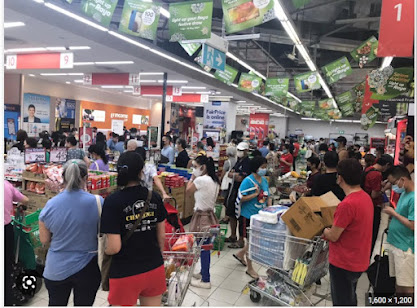Around three years back, I took a weekend job as a supermarket promoter. The job was very simple. All I had to do was to get people to buy a certain number of items and they would get a freezer bag in return.
The job was an eye opener to the realities of human nature or more accurately it was an eye opener into the problem with the word “free.”
People who are normally rational suddenly turned into greedy little things at
the prospect of getting something for “free.” We had to deal with people who
would poke at the products were trying to promote with no consideration of the
fact that this was food and their prodding was damaging whatever protection the
food items had) and you had people trying to squeeze every last penny they had
to get the “free” bag.
From a sales and marketing perspective, the campaign was a brilliant success. Sales went through the roof as people loaded up on the specific items just to claim “free” bags (and for being part of the team that sold the most, I got a bag stuffed with goodies). However, from a social point of view, one is forced to question why otherwise nice, normal people turn into snarling beasts just to get “free” things, which they may not necessarily need.
In Singapore, we call this the “Kiasu” (Hokkien for “scared to lose”) mentality. I guess you could say that the “Kiasu” mentality has made us dedicated to our jobs as we race up the corporate ladder to get away from the rest of the pack. On the negative side, we become greedy monster who get into brawls over the most mundane things when they’re give away. I kid you not, but “Hello Kitty” toys given away as promotions have caused far more social unrest than say campaigns for freedom of speech, human rights or the death penalty.
Funnily enough, the “Kiasu” side of us has also shown that we, as a nation, can laugh at ourselves. There is a local comic strip called “Mr. Kiasu” which is based on characters around the traits that we see in ourselves.
Who says Singaporeans can’t laugh at ourselves? Who
Says there’s no local talent?
Being “Kiasu” is not exactly unique to Singapore. As is often said in the British context, half the problems in the NHS are due to the fact that people come into hospital for the most minor of ailments because – it’s free. However, I guess because Singapore is small, this phenomenon has become particularly intense.
The “FOMO” (Fear of Missing Out) that my Western friends talk about is nothing when compared to the Singaporean “Kiasu.” As mentioned in my supermarket promoter experience, its most visible whenever there’s a promotion and something is offered for “free.”
Now, from a marketer’s perspective, this is great. You just need to ensure that your “cheap” (it usually is) gift is paid for in the promotional price. Everyone wants to get the “free” thing without considering the fact that they may actually have had to spend more than they normally would have in order to get the freebie.
Buffets are another good place to view Kiasuism in action. You get people who load up their plates because, well, its important to get as much as you can for what you paid. Unfortunately, this also leads to food wastage and one stage, buffets had to put up signs informing customers that they would charge for food wastage.
Unfortunately, Kiasu isn’t limited to vicious aunties in supermarkets. Attended a property seminar earlier this week where there was there was an accountant giving a talk about the various taxes when dealing with property investment. The poor man had problems after his talk as people cornered him and bombarded him with “individual” tax queries.
It took him nearly an hour before he could get to his food. I actually told one of the perspective investors that they could simply “hire” the accountant and get all the advice she wanted. She glared at me and said “I intend too but I need to absorb as much as I can,” before limping away in indignation. The accountant shrugged and admitted that it is difficult to know where to draw the line.
Its easier to deal with “Kiasu” customers if you deal with physical goods. You just adjust your prices accordingly. With “professional” advice it becomes more challenging. How, for example do you draw the line between friendly
advice and professional advice and once you’ve crossed that line – how do you take back your professional advice once you’ve given it?
Hence, professionals need to work out how they deal with people in a kiasu market place? The question is, how do you give away enough to get the client without giving away so much that you don’t get paid?
A version of this article first appeared at beautifully incoherent.blogspot.co



